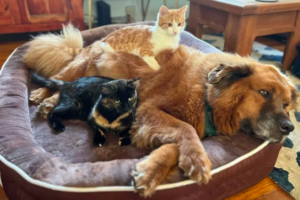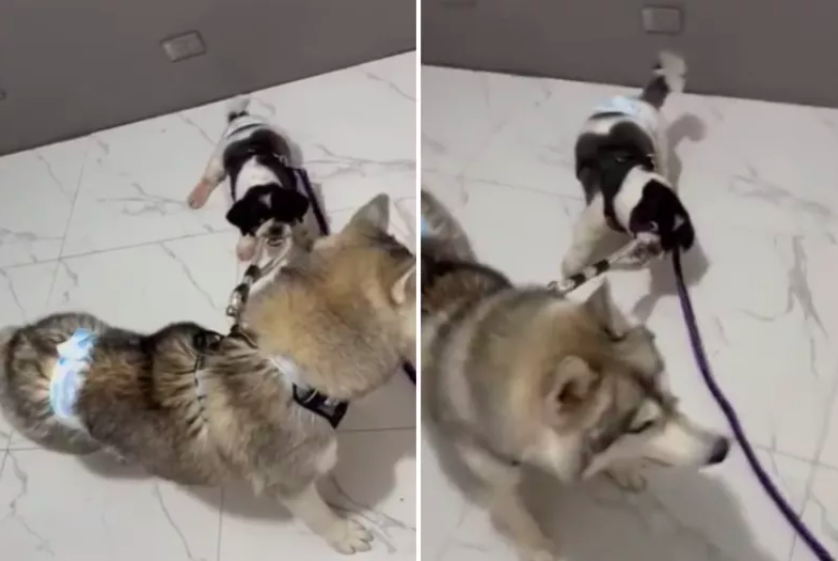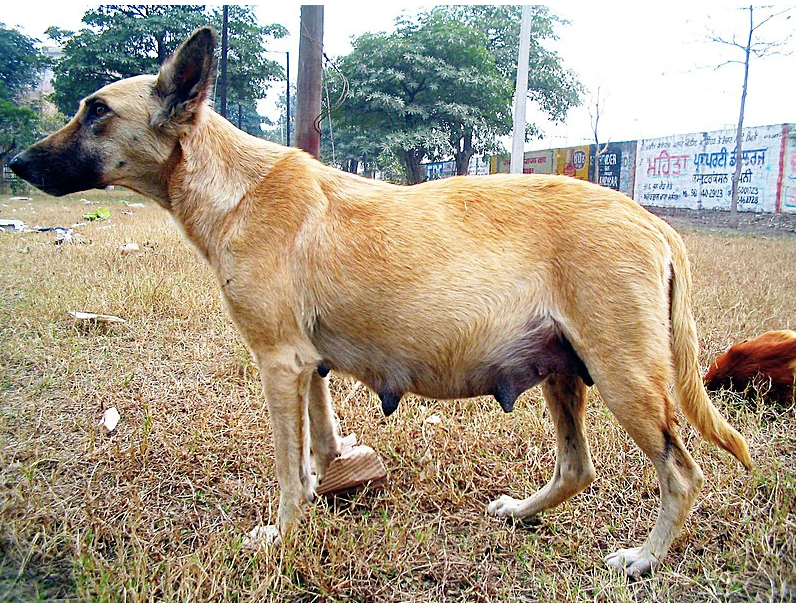Trending Pet Stories
How Avalanche Dogs Like Millie Learn Life-Saving Skills on the Ski Slopes

How Avalanche Dogs Like Millie Learn Life-Saving Skills on the Ski Slopes
In the snowy peaks of Idaho, one dedicated canine is being trained to save lives. Millie, a one-and-a-half-year-old English Lab and English Pointer mix, is learning the art of avalanche search and rescue, and her inspiring journey has captivated thousands online. The viral video of Millie’s training, shared by her handler, ski patroller Luma Randolph, showcases the incredible bond between humans and dogs while shedding light on the critical role these animals play in avalanche emergencies.
What Does an Avalanche Dog Do?
Avalanche dogs are an essential part of ski patrols and rescue teams worldwide. These highly trained animals use their extraordinary sense of smell to locate people trapped beneath snow after avalanches or snow immersions. In scenarios where victims aren’t wearing avalanche beacons, dogs become the best hope for survival.
As Randolph explains, “Millie’s job as an avalanche dog will be to detect any humans buried underneath the snow after an avalanche or snow immersion using her sense of smell and alert me to their location.”
This skill is lifesaving. According to statistics from VetStreet, a person buried under snow has a 90% survival chance in the first 15 minutes, which drops drastically to 50% after 30 minutes. Avalanche dogs, with their ability to cover more ground faster than human teams, significantly improve rescue response times.
A Day in the Life of Millie: Training for Heroism
The viral TikTok video, shared under the username @luma.randolph, provides a glimpse into Millie’s rigorous yet heartwarming daily routine. Here’s a breakdown of her typical day:
- Morning Snuggles and Breakfast: Millie starts her day with some affectionate cuddles and a nutritious meal.
- Daily Patrol Meetings: She attends morning briefings with her handler, preparing for the day’s activities.
- Rescue Training and Drills: Millie practices search-and-rescue techniques, honing her ability to detect scents beneath deep layers of snow.
- Obedience Training: This ensures she follows commands accurately during high-pressure situations.
- Rest and Recovery: Like any working professional, Millie enjoys naps to recharge between tasks.
This structured routine is designed to build her skills while ensuring she stays happy and healthy.
Why Are Avalanche Dogs So Effective?
The effectiveness of avalanche dogs lies in their extraordinary sense of smell. Here are some fascinating facts about their abilities:
- Incredible Smell Sensitivity: Dogs have a sense of smell estimated to be 100,000 times more sensitive than humans.
- Specialized Nose Receptors: Dogs have between 20 and 50 times as many olfactory receptors as humans.
- Ability to Detect from Afar: Under ideal conditions, dogs can detect scents from up to 12 miles away.
- Efficiency in the Field: One avalanche dog can search more terrain faster and more thoroughly than a team of 20 human rescuers.
These traits make dogs indispensable in search-and-rescue missions, especially in life-threatening avalanche emergencies.
Millie’s Story Goes Viral: Inspiring Dog Owners Everywhere
Millie’s journey resonated with thousands on social media. Her training routine was shared on TikTok, where it received over 530,000 views and 63,600 likes.
Comments poured in from amused and inspired viewers:
- “Showing this to my two terriers with NO jobs and all the audacity,” joked one user.
- “My pugs don’t know what work is, I’m showing this to them the freeloaders,” added another.
- “I’ve never thought about working dogs getting ready for their jobs,” one commenter admitted.
The video not only entertained but also sparked discussions about the dedication and capabilities of working dogs.
@luma.randolph Avy dog millie’s first day back on the hill this season! #ski #skitok #skipatrol #dogsoftiktok #avalanchedog #avydog
The Science Behind Canine Search-and-Rescue Skills
Millie’s training taps into natural canine instincts, fine-tuned for human safety.
How Dogs Learn to Search and Rescue:
- Scent Discrimination: Dogs are trained to differentiate between human scents and other smells.
- Reward-Based Training: Positive reinforcement techniques ensure dogs associate successful searches with rewards, such as treats or praise.
- Simulated Drills: Handlers bury objects or people under the snow, allowing dogs to practice detection in real-world conditions.
- Building Trust: The bond between a dog and its handler is crucial, as it ensures seamless communication during rescues.
This scientific approach, combined with dogs’ natural talents, makes them unparalleled rescue partners.
Why Millie’s Story Matters
Millie’s journey highlights more than just her skills—it underscores the deep bond between humans and dogs and the critical role animals play in saving lives. These stories remind us of the extraordinary capabilities of our four-legged companions and their willingness to put themselves in danger to protect us.
Tips for Understanding Working Dogs
If you’re fascinated by working dogs like Millie, here are some key points to consider:
- Different Jobs, Different Breeds: From avalanche rescue to police work, certain breeds are better suited to specific roles due to their physical and mental attributes.
- Training Is Ongoing: Even experienced working dogs undergo regular drills to maintain their skills.
- Balancing Work and Play: Like Millie, working dogs need time to relax and bond with their handlers outside of their duties.
- Nutrition and Care Are Key: A balanced diet and proper veterinary care ensure these dogs stay in top condition.
- Handlers Play a Crucial Role: A strong partnership between dog and handler is essential for effective communication and trust.
Conclusion
Millie’s story serves as an inspiring reminder of the powerful role dogs play in our lives, especially in times of crisis. Her dedication to becoming an avalanche rescue dog showcases the incredible potential of working dogs and the life-saving impact they can have in the harshest conditions.
Whether it’s through viral videos or real-life rescues, dogs like Millie continue to amaze and inspire, proving that they are more than just pets—they are heroes.
Frequently Asked Questions (FAQs)
What breeds are best suited for avalanche rescue work?
Breeds like Labrador Retrievers, German Shepherds, and Border Collies are often chosen for their intelligence, stamina, and strong sense of smell.
How long does it take to train an avalanche dog?
Training can take up to two years, depending on the dog’s abilities and the complexity of the skills required.
Can any dog become an avalanche dog?
Not all dogs are suited for this type of work. The ideal candidates are energetic, trainable, and have a natural drive to work.
How do avalanche dogs stay safe during rescues?
Handlers prioritize the safety of their dogs by providing proper gear and monitoring conditions during rescue missions.
What happens when avalanche dogs retire?
Retired avalanche dogs often stay with their handlers, enjoying a life of leisure after years of service.
We appreciate you for taking the time to read this article!
Finally, we hope you found this article interesting? And what do you think about ”How Avalanche Dogs Like Millie Learn Life-Saving Skills on the Ski Slopes!?”
Please feel free to share or inform your friends about this article and this site, thanks!
And let us know if you observe something that isn’t quite right.
References: Original Article on Newsweek
Trending Pet Stories
The Vet Gave My Dog 20 Days: Making the Heartbreaking Decision to Say Goodbye”

The Vet Gave My Dog 20 Days: Making the Heartbreaking Decision to Say Goodbye
When our pets face serious illnesses, the heartbreak and tough decisions we must make are indescribable. In a poignant tale of love, resilience, and loss, Liz O’Connell shares her journey with Diesel, her 12-year-old Chow Chow mix, who was diagnosed with cancer. Through her story, she opens a conversation about dealing with grief, making end-of-life decisions, and cherishing every precious moment with our furry companions.
A Shocking Diagnosis: Valley Fever or Cancer?
Diesel’s decline began subtly. Liz noticed he was skipping meals and seemed slightly off. It wasn’t until he exhibited concerning symptoms like bloating and retching that Liz and her husband rushed him to an emergency animal hospital late one night.
At first, the vet suspected valley fever, a fungal infection common in desert regions like Arizona. However, X-rays told a different story. They revealed a large mass near Diesel’s heart, prompting further testing. A week later, the dreaded call confirmed the diagnosis: hemangiosarcoma, a deadly and fast-growing cancer that commonly affects dogs. This cancer had gone undetected during previous health checks and was now aggressively threatening Diesel’s life.
Understanding Hemangiosarcoma: The Silent Killer
What Is Hemangiosarcoma?
Hemangiosarcoma is a malignant cancer that arises in blood vessel linings. It is known as a “silent killer” because its symptoms often remain hidden until it’s too late.
Common Symptoms
- Sudden lethargy
- Loss of appetite
- Difficulty breathing
- Bloated abdomen
- Collapse or fainting spells
The Grim Statistics
In the U.S., 300,000 dogs succumb to hemangiosarcoma annually, accounting for up to 7% of canine cancer deaths. Its aggressive nature and lack of early warning signs make it one of the most devastating diagnoses for pet owners.
The Heartbreaking Decision: When Is It Time?

Liz faced the unimaginable choice of deciding when to let Diesel go. Her veterinarian explained the harrowing potential outcomes if the cancer progressed further—internal bleeding or heart failure, both of which could cause immense suffering.
Tips for Making the Right Decision
- Monitor Quality of Life: Look for changes in behavior, appetite, and physical activity.
- Consider Pain Management: Observe signs of pain or discomfort.
- Consult Your Veterinarian: Professional advice can guide you through options and timing.
- Listen to Your Pet: Sometimes, their demeanor shows they’re ready to let go.
Cherishing Diesel’s Final Days
Liz took time off from work to ensure Diesel’s last days were filled with joy and love. Together, they revisited favorite parks, indulged in delicious treats like pizza and pup cups, and savored quiet moments at home. His feline siblings, Willow and George, stayed close, offering comfort in their own unique ways.
How to Create Lasting Memories
- Capture Moments: Take photos and videos to cherish forever.
- Spoil Them: Treat them to their favorite foods and activities.
- Focus on Comfort: Surround them with their favorite blankets, toys, and familiar faces.
- Savor the Routine: Even small, daily rituals can become treasured memories.
The Role of At-Home Euthanasia
To spare Diesel the anxiety of a vet’s office, Liz opted for at-home euthanasia. This compassionate service allows pets to spend their final moments in familiar surroundings, surrounded by loved ones.
What to Expect During At-Home Euthanasia
- Sedation: The vet administers a sedative to help the pet relax.
- Euthanasia Injection: A second injection gently and painlessly stops the heart.
- Family Support: Owners can remain by their pet’s side throughout, providing comfort and love.
For Liz, the peaceful passing marked a bittersweet farewell. As Diesel took his final breath, she heard birds chirping outside—a poignant moment she interpreted as a sign that Diesel was at peace.
Coping with Pet Grief
The loss of a pet can feel isolating, as society often undervalues the depth of this bond. Liz describes the overwhelming grief she felt after Diesel’s passing but emphasizes the importance of allowing yourself to mourn.
Ways to Navigate Pet Grief
- Join Support Groups: Share your experiences with others who understand.
- Create a Memorial: Honor your pet with photos, keepsakes, or a dedicated space.
- Write It Out: Journaling can help process emotions and preserve memories.
- Lean on Loved Ones: Talk to friends and family who knew and loved your pet.
- Seek Professional Help: Pet grief counselors can provide valuable support.
Remembering Diesel: A Life Well-Lived
Diesel’s life was one of adventure, love, and resilience. Rescued from neglect, he thrived under Liz and her husband’s care, experiencing everything from cross-country road trips to mornings at coffee shops. His presence brought joy to strangers and unwavering companionship to his family.
Liz reflects on his remarkable journey:
“From a neglected pup tied to a tree to a cherished member of our family, Diesel lived a life full of love and adventure. He will always be remembered for his fluffy tail, his gentle soul, and the countless smiles he brought to everyone he met.”
Final Thoughts
The decision to say goodbye to a beloved pet is one of the hardest any owner will face. Liz O’Connell’s story reminds us of the profound love we share with our animals and the importance of cherishing every moment. While the pain of loss is inevitable, the memories and joy they bring will last a lifetime.
FAQs About Pet Euthanasia and Grief
How do I know it’s time to say goodbye to my pet?
When your pet’s quality of life diminishes significantly—showing signs of pain, discomfort, or loss of interest in daily activities—it may be time to consider euthanasia.
What is at-home euthanasia, and how do I arrange it?
At-home euthanasia is a service where a veterinarian comes to your home to provide a peaceful passing for your pet. Contact your vet or search online for specialized providers in your area.
How long does it take to grieve a pet’s loss?
Grief has no timeline. Some people may start to heal within weeks, while others take months or years. Allow yourself to grieve at your own pace.
Can other pets in the home sense the loss?
Yes, pets often pick up on changes in the household and may exhibit signs of grief, such as lethargy or changes in behavior.
How can I honor my pet’s memory?
You can create a scrapbook, plant a tree in their honor, donate to an animal charity, or simply share their story with others to celebrate their life.
We appreciate you for taking the time to read this article!
Finally, we hope you found this article interesting? And what do you think about ”The Vet Gave My Dog 20 Days: Making the Heartbreaking Decision to Say Goodbye”!?”
Please feel free to share or inform your friends about this article and this site, thanks!
And let us know if you observe something that isn’t quite right.
Original Article: Newsweek – The Vet Gave My Dog 20 Days
Trending Pet Stories
Oldest Dog at Shelter Finds Joy With Pup Cup While Waiting for His Final Home

Oldest Dog at Shelter Finds Joy With Pup Cup While Waiting for His Final Home
A Senior Dog’s Heartwarming Story of Resilience and Love
The story of Cotton Eyed Joe, a 12-year-old Chihuahua mix, is melting hearts worldwide. Once a stray, Cotton Eyed Joe was brought into a shelter where he waited for an end-of-life foster home. Despite his challenging circumstances, this senior pup’s joyful spirit remains unbroken. His story highlights the resilience of animals and the deep bond humans share with their pets.
A Special Day for Cotton Eyed Joe
An Outing Filled With Love
To bring attention to Cotton Eyed Joe’s plight, shelter volunteer Julie Saraceno organized a special day out. She dressed him in a cozy Christmas sweater, and the two enjoyed a leisurely stroll together.
As part of the outing, Cotton Eyed Joe was treated to a car ride, ending with a classic favorite—a pup cup, a small whipped cream treat for dogs. Saraceno captured the touching moment in a now-viral video on Instagram, which she captioned:
“POV: You promise a shelter dog an amazing day out and hope that posting it will find him an end-of-life foster.”
Why It Was More Than Just a Treat
This small gesture symbolized more than just a day of fun. It gave Cotton Eyed Joe a chance to feel special and loved while showing potential foster families the beauty of caring for a senior dog.
The Challenges Senior Dogs Face in Shelters
Medical Needs but a Happy Spirit
Like many senior dogs, Cotton Eyed Joe has his share of health challenges, including a grade 3-4 heart murmur and the need for kidney-support food. Despite these, he is described as a loving, happy pup who enjoys snuggling in warm sweaters and resting by the staff’s side.
Senior Dogs: The Forgotten Souls in Shelters
Senior dogs are often overlooked in shelters, with many adopters opting for younger, more energetic pets. Yet, these older animals often have the most gratitude and love to give. Cotton Eyed Joe’s story is a reminder of the joy senior pets can bring.
View this post on Instagram
Pet Homelessness in the U.S.: A Growing Concern
Staggering Statistics
According to estimates, over 6.3 million pets enter U.S. shelters annually, averaging 17,260 pets every day. While many find new homes, approximately 920,000 pets are euthanized annually due to a lack of resources and space.
Senior dogs like Cotton Eyed Joe are particularly vulnerable. They face additional challenges in finding homes due to their age and potential medical needs.
A Happy Ending for Cotton Eyed Joe
Fortunately, Cotton Eyed Joe’s story took a happy turn. Shortly after Saraceno’s video went viral—garnering over 34,300 views and more than 5,100 likes—a compassionate foster family stepped forward. Now, this sweet pup can enjoy his remaining days in a loving home, free from worry.
How Social Media Helps Shelters and Senior Pets
Social media has become a vital tool for shelters, allowing them to showcase animals in need. Viral videos like Cotton Eyed Joe’s not only generate awareness but also inspire action, encouraging potential adopters to consider overlooked pets.
Why Adopt or Foster Senior Dogs?
1. Unmatched Gratitude
Senior dogs often show immense appreciation for the care they receive, forming deep emotional bonds with their adopters.
2. Easier to Manage
Older dogs are typically calmer and already trained, making them easier to integrate into a home.
3. Giving Back
Providing an end-of-life home for a senior dog is an act of kindness, ensuring they spend their final days surrounded by love.
Conclusion
Cotton Eyed Joe’s story is a touching reminder of the love and resilience of senior shelter pets. Thanks to a volunteer’s kindness and the power of social media, he found the perfect home for his golden years. Stories like his encourage us to look beyond age or medical conditions when choosing pets, focusing instead on the love and joy they bring into our lives.
FAQs About Adopting Senior Dogs
Are senior dogs harder to care for?
Senior dogs may have medical needs, but many are manageable with proper care. They’re also calmer, requiring less physical activity than younger dogs.
How can I help senior dogs in shelters?
You can adopt or foster, donate to shelters, or volunteer your time to help promote adoptable senior pets.
What are the benefits of fostering senior dogs?
Fostering provides a temporary home for senior dogs, offering them comfort and love while they await permanent placement.
How can social media help shelter pets?
Sharing posts about adoptable animals increases visibility, potentially reaching adopters who wouldn’t have seen the pets otherwise.
Are senior pets suitable for families?
Yes! Senior pets often adapt well to family life, offering calm companionship and love.
We appreciate you for taking the time to read this article!
Finally, we hope you found this article interesting? And what do you think about ”Oldest Dog at Shelter Finds Joy With Pup Cup While Waiting for His Final Home!?”
Please feel free to share or inform your friends about this article and this site, thanks!
And let us know if you observe something that isn’t quite right.
Original article: Newsweek – Oldest Dog at Shelter Gets Pup Cup as He Waits for ‘End of Life’ Home
Trending Pet Stories
Shih Tzu Shows Husky Who’s Boss: Pet of the Week Highlights

Shih Tzu Shows Husky Who’s Boss: Pet of the Week Highlights
The heartwarming and often hilarious dynamics between pets have once again taken center stage, thanks to Newsweek’s “Pet of the Week” series. This week, a charming Shih Tzu mix named Edji, alongside his companion, Kairo the Siberian Husky, stole the spotlight. Their viral video, showcasing the pint-sized Edji leading the much larger Kairo by his leash, epitomizes how personality often trumps size.
Here’s a closer look at this story and other unforgettable moments from this week’s pet features.
Edji and Kairo: The Unlikely Duo That Won Our Hearts
Big Attitude in a Small Package
Edji, a confident Shih Tzu mix, took command of the leash during a playful interaction with Kairo, a Siberian Husky. In the viral video shared by their owner, Resi Agustin, Edji firmly grips Kairo’s leash and gives it a playful tug, confidently asserting his dominance despite their stark size difference.
Resi explained:
“They have a lot of playtime together. They are very playful.”
Beyond being an assertive little pup, Edji is also a fan of creature comforts, particularly hanging out in air-conditioned rooms—a testament to his spoiled but adorable personality.
Why the Video Resonates
The video of Edji and Kairo challenges the stereotypical notions of size and power, showing how smaller pets often possess oversized personalities. It’s a reminder of how unique each animal’s temperament can be, regardless of their breed or physical stature.
Finalists That Captivated Hearts This Week

While Edji and Kairo took the top spot, other pets also made a mark with their quirky and lovable antics.
1. Hazel: The Social Butterfly
Hazel, a lively pup with an uncontainable zest for life, earned her place among the finalists. Her owner, Tes Bryant, shared Hazel’s love for visiting her best dog friend, Tucker.
Hazel’s exuberance is evident in her cheeky attempts to avoid leaving playdates:
“When it’s time to go, she even hides from me!”
Hazel’s happy tail wagging and lively energy have made her a joy to watch and a testament to the simple pleasures pets bring into our lives.
2. Mazylue: The Mischievous Aussie Shepherd
Mazylue, affectionately called “Crazy Lue” by her family, is an Australian Shepherd with a penchant for mischief. From “stealing” household items like shoes, spatulas, and oven mitts to proudly displaying them on the family trampoline, Mazylue’s antics have kept her family endlessly entertained.
Despite successfully completing puppy training, Mazylue hasn’t lost her mischievous streak. Her owner, Kimber Thivierge, cherishes every quirky habit:
“She’s the craziest dog I’ve ever owned, but I wouldn’t change her for the world.”
3. Salem: The Affectionate Feline
Salem, a devoted cat with an unbreakable bond to his owner, Rebecca Keep, rounds out this week’s finalists. Unlike many aloof felines, Salem thrives on constant companionship, waking Rebecca with gentle licks and sharing meals alongside her.
Rebecca describes Salem as a crucial part of their family, providing hope and joy as she and her husband look forward to growing their family in the future.
“Though they say dogs are man’s best friend, for me, it’s Salem,” she shared.
Why Pet Stories Matter

Celebrating the Joy of Pets
Stories like these highlight the irreplaceable role pets play in our lives, whether through their amusing antics or their unwavering companionship. They bring out the best in us, teaching lessons in love, loyalty, and resilience.
Key Takeaways from This Week’s Pets
- Personality Over Size: Edji proves that confidence isn’t determined by physical stature.
- The Power of Friendship: Hazel’s playful antics show the importance of companionship for pets.
- Unique Quirks: Mazylue and her mischievous habits highlight the individuality of each pet.
- Unconditional Love: Salem’s constant presence reminds us of the emotional support pets offer.
FAQs About Pet Behavior and Care
Why do small dogs often act dominant around larger dogs?
Small dogs can display assertiveness due to their high confidence levels or instinctive need to establish dominance in social interactions.
How can I encourage positive interactions between pets of different sizes?
Supervise their playtime, use positive reinforcement for good behavior, and ensure both pets feel safe and comfortable.
Why do some dogs “steal” objects like Mazylue?
Dogs may “steal” objects for attention, boredom, or as part of their playful nature. Providing enrichment activities can help redirect this behavior.
What are the benefits of keeping pets like Salem close to their owners?
Close bonds with pets can reduce stress, provide emotional support, and enhance overall well-being for both the pet and owner.
How can I get my pet featured in publications like Newsweek’s “Pet of the Week”?
Submit your pet’s photos, videos, and stories to the respective publication following their guidelines for entries.
We appreciate you for taking the time to read this article!
Finally, we hope you found this article interesting? And what do you think about ”Shih Tzu Shows Husky Who’s Boss: Pet of the Week Highlights!?”
Please feel free to share or inform your friends about this article and this site, thanks!
And let us know if you observe something that isn’t quite right.
Original article: Newsweek – Shih Tzu Showing Husky Who Is Boss Wins Pet of the Week
-

 Pet Care2 years ago
Pet Care2 years agoThe Best Dog Collars For 2022
-

 Dogs2 years ago
Dogs2 years agoBichon Frise: The Happy, Playful, and Cuddly Companion
-

 Trending Pet Stories1 year ago
Trending Pet Stories1 year ago2023 ‘World’s Ugliest Dog’ Winner: Scooter’s Tale of Resilience
-

 Animals3 years ago
Animals3 years agoAre There Animals Having Down Syndrome?
-

 Pets2 years ago
Pets2 years agoThe Fascinating World Of The Red Chameleon
-

 Dogs3 years ago
Dogs3 years agoTop 10 Most Popular Dog Breeds According To AKC.
-

 Dogs2 years ago
Dogs2 years agoDogs 5 Weeks Pregnant: A Comprehensive Guide To Canine Pregnancy
-

 Dogs3 years ago
Dogs3 years ago21 Dog Breeds That Resemble Bears Or Teddy Bears!







